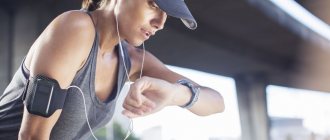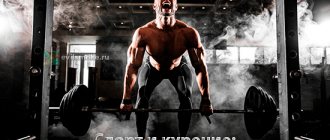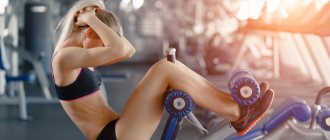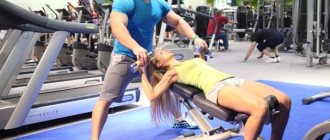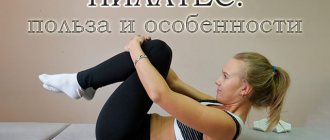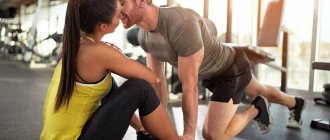Post-workout insomnia is an undeniable health problem. Normal healthy sleep is not only a need for the body, but also one of the sources of good health and good mood. Most doctors consider long-term insomnia to be a serious disorder, which most often leads to various diseases. Often people who actively engage in sports suffer from sleep disturbances. It is necessary to find out its main causes and methods of treating this disorder.
Causes of insomnia
Trainers who plan the load based on the general principles of strength training believe that there can only be one reason - inadequately selected volume and intensity of exercises.
Let’s say a fitness beginner comes to the gym and immediately runs to do a heavy platform leg press in 4-5 working approaches, and then walks with lunges, “pumps” the quadriceps, hamstrings and calves in 5 working approaches. For some professional this is not volume. But for someone who bought a subscription yesterday and started a new life, this is a clear provocateur of overstimulation of the central nervous system.
Important! In health fitness, you should not perform more than 12 working approaches per muscle group if we are dealing with an athlete who has been training for the first year.
The second reason is an overestimation of intensity, that is, “all approaches to failure.” This can be effective for muscle growth, but is very demanding on the state of the nervous system. Therefore, it is worth approaching “refusal” in only one approach – the final one.
The third is excessive passion for cardio exercise. Yes, cardio helps increase calorie expenditure and reduce fat percentage, but sessions longer than 40-50 minutes, or high-intensity interval training, when a person gives all his best, can provoke insomnia.
Is it worth exercising while lacking sleep?
We are sure that you have more than once encountered the thought of canceling a gym due to poor health after a night when you hardly slept or slept very little. Many people reject this idea and believe that they will show weakness if they exchange strong dumbbells for a soft bed.
They take their will into their fist, go to the gym and... They discover that their working weights have dropped, their concentration is zero, and their endurance leaves much to be desired. This body response to lack of sleep is not an isolated case .
As a number of studies have shown, in the dilemma between sleep and training, preference should always be given to the former and not open the gym door without a long, multi-hour meeting with a pillow. And that's why.
Decrease in strength indicators
Sleep deprivation can lead to decreased strength performance. A study from Liverpool John Moores University (1) found that after only the second night of 3 hours of sleep, a group of subjects experienced a significant drop in strength in exercises such as the leg press, deadlift and bench press.
Due to a decrease in strength indicators, training with a lack of sleep will be ineffective. After all, you will not only not be able to comply with the principle of progression of weights, but you simply will not be able to handle your standard working weight. The result is that muscle fibers will not receive sufficient stimulation to grow .
Decreased testosterone
Another study (2) found another interesting fact related to lack of sleep. This time, the group of subjects slept a little longer - about 5 hours, and the experiment lasted about a week.
After 7 days, it was found that testosterone levels had decreased by 10-15% in the vast majority of those who took part in the experiment.
At the same time, the study noted decreased libido, concentration and weak energy tone.
If the 10-15% numbers aren't convincing, we have a more pessimistic study from the University of Singapore (3), where 4 hours of sleep caused a 60% drop in testosterone when compared to levels after 8 hours of sleep.
By the way, along with testosterone, the secretion of another anabolic hormone - somatropin, or growth hormone - decreases. Its concentration also peaks at night.
Since testosterone plays a key role in building muscle mass, a lack of testosterone can easily result in you finding yourself in a training plateau and unable to progress in muscle mass.
Training after a sleepless night will not save you - they will cause only a slight secretion of testosterone after the gym, but in the long term the testosterone level will be significantly below normal.
Especially if you experience lack of sleep systematically.
Increased cortisol
Low testosterone? Get a boost in cortisol. This is exactly the effect sleep deprivation has on your hormonal system, according to a study from the University of Chicago (4). If we talk about more precise numbers, we are talking about an increase in cortisol by 37 and 45% in groups where they slept for 4 hours or did not sleep at all.
Cortisol is not the best partner for building muscle mass, because it causes the body to break down muscle fibers and store fat . Well, if you remember that after a tiring workout, the level of cortisol already rises, then the desire to go to the gym after a night without sleep should, in theory, disappear by itself.
The effect of cortisol
Both facts say the same thing: after lack of sleep, your body is in a state of catabolism and can only burn muscle tissue. At the same time, even an afternoon nap is not able to move cortisol levels from a dead point; the hormone still continues to be above normal levels throughout the day.
High cortisol levels will have a negative effect on both strength training and aerobic training.
In the first case, it will make the body more willing to receive energy due to the breakdown of muscle tissue, and in the second, it will be less willing to burn fat.
So the best solution is to go to bed and have a good breakfast the next day. Both factors will help reduce stress hormone levels in a short time, so that you go to training full of energy.
Decreased insulin sensitivity
A number of studies have long shown (5) that sleep deprivation reduces the body's sensitivity to insulin.
This leads to the fact that the body will poorly accumulate muscle glycogen - the main source of energy that it uses during training.
As a result, when going to the gym after lack of sleep, the meager glycogen reserves can be used up very quickly, after which you will most likely feel a loss of strength, loss of concentration and a decrease in strength characteristics, which we wrote about in the first paragraph.
Many people believe that the lack of strength after a sleepless night can be easily compensated by eating a hearty lunch 2 hours before training. Unfortunately, due to decreased sensitivity to insulin, this technique may not work: the body simply will not have time to synthesize glycogen from incoming carbohydrates, and as a result, its energy reserves will be limited.
[/accordion]
insomniasleep deprivation lack of sleep
Source: https://6pack.ru/trenirovka-s-nedosipa/
Does nutrition matter?
Most often, a person does not realize, but the reason for his insomnia is not so much in the training plan, but in the diet inspired by the best bodybuilders. The fact is that many people do not eat carbohydrates after training, trying to become “lean”. And this contributes to a rapid drop in blood sugar levels.
The body clearly hints at food, the athlete suffers, sleep does not come. At the same time, there may be enough amino acids in the blood, which are associated with “anti-stress” and the fight against insomnia. Stan Efferdeen, author of The Vertical Diet and nutritionist for athletes as diverse as Thor Bjornson and Stephanie Sanzo, writes that simply adding a portion of carbohydrates to your last meal is enough.
After a workout, the average athlete needs about a gram of carbohydrates per kilogram of body weight for recovery. Half of this amount can be obtained with a post-workout drink, half with food.
Why do you want to sleep after training? Is this useful?
Exercise requires a lot of energy! You may feel energized for a few minutes after exercise, but once our brain realizes that the burst of activity is over, it will go into recovery mode. Rest and relaxation are a must after exercise, and eating to refuel may be in order. If you feel sleepy immediately after an aerobic or cardio session, this may be the first sign that you've overdone it. If you are not used to working out, be sure to start your workout slowly and at a reasonable pace.
Insomnia and training and living conditions
Insomnia is more likely to overtake someone who is naturally more impressionable and purposeful than a calmer athlete. If the psyche is “mobile” and a person tends to quickly change emotional states, he should not train right before bed. No time? Then you will have to leave the “cool down” on the treadmill and instead master a set of stretching exercises, or increasing the mobility (mobility) of the joints.
Ideally, 2-3 hours should pass between the end of class and going to bed. Before going to bed, it is recommended to do something relaxing - a massage, a bath, a leisurely walk, reading.
Important! Scientists are still against us using social networks before bed. Bright pictures and videos can contribute to nervous arousal. And viewing other people’s excellent results does not always set the mood for positive emotions.
Cons of sleeping immediately after training
Going to bed immediately after class is not the best solution. The disadvantages are as follows:
- The body can burn fewer calories if you go to bed immediately after an active workout. However, there is also conflicting evidence that lying down or taking a nap after exercise may actually promote weight loss.
- An intense workout can leave you feeling wound up and unable to go to sleep immediately afterwards.
- Exercise increases cortisol levels. This is a hormone of vigor and freshness, so increased amounts can prevent sleep.
How to deal with insomnia
If reducing the intensity and volume does not help, it is worth reviewing the dietary supplements that are taken to improve results:
- Fat burners with caffeine and geranium extract are excluded. It makes sense to switch to L-carnitine without additives while treating insomnia.
- The dosage of vitamin C and B vitamins, as well as iron, is reduced if dietary supplements interfere with falling asleep.
- All stimulants like African mango extract, green tea, black tea are canceled.
- Any pre-workout complexes and household stimulants such as tea and coffee before bed are excluded.
- Before going to bed, avoid taking BCAA and other amino acids. Replace them with casein protein.
Sometimes insomnia is associated with high levels of sex and thyroid hormones, but here the athlete should ask himself whether he is doing enough in training if he cannot sleep afterwards.
How to get rid of it?
Note: Our advice is provided for informational purposes only. If insomnia continues to haunt you despite the measures taken, consult a therapist for an examination and to identify the real cause of poor sleep.
To understand the consequences of training, you need to understand what exactly caused insomnia. Depending on the factor, one or another remedy is used. But there are a few simple recommendations that will help you fall asleep without medications.
- Normalization of the daily routine. If you get up and go to bed at the same time, the body will sooner or later begin to produce melatonin on its own closer to the specified time.
- Keep a training diary. With proper training, you will not get a critical level of stress, and the diary will help you tune in and carry out the plan without doing too much or less. Adequate load creates the usual level of stress factor, to which the nervous system gradually adapts.
- Don't use pre-workout supplements. As practice has shown, the real physical gain from them is minimal, and side effects almost always occur.
- Do not use sleeping pills, as stopping them will make your insomnia worse. Instead, try calming your body with sedatives.
Dietary supplements for sleep
In sports, it is most often recommended to take gamma-aminobutyric acid and melatonin in order to normalize circadian rhythms and get rid of insomnia. You should know that GABA is not a dietary supplement; it is a medicine with contraindications such as high blood pressure, individual intolerance, epilepsy and pregnancy. GABA should only be taken as directed by a doctor.
Melatonin has no proven effectiveness. In some situations, it is powerless, and it should always be taken comprehensively, along with changes in the training plan and nutrition plan.
The dosages of both substances are determined individually, GABA starts from 700 mg, gradually increasing the dose, melatonin - from 1 mg. If insomnia is chronic, it is recommended to take melatonin 1 g 3 times a day, during meals.
Does it make sense to purchase special sleep medications from sports nutrition? Yes, if there is no allergic reaction to valerian, motherwort, and contraindications to taking GABA and melatonin. Most often, it is these substances that are part of the “dream book”.
Healthy eating is the key to health!
Why do you want to sleep after training? How to eliminate this condition?
There can be several approaches, and very different ones:
- It is necessary to exclude the risk of any diseases. You should definitely see a doctor. If you are healthy, then most likely this will be solved by some changes in your daily routine.
- Make sure you get enough sleep. It is better if your sleep covers the period from 00:00 to 04:00 hours.
- Sports or any other active activity should be done in the first half of the day, as mentioned above, since evening exercise causes drowsiness.
- Try to exercise as often as possible, 4 to 6 times a week, but not for so long, about 40 minutes, not including warm-up and stretching. Rare but long exercise can cause lethargy, deplete the body, and this can lead to problems with the gastrointestinal tract. But short and regular exercise has a positive effect on your body and metabolism.
- You should also pay attention and adjust your diet. After all, fasting and low carbohydrate consumption negatively affect blood sugar. This condition is called hypoglycemia. And excessive weakness, fatigue and lethargy are its first symptoms.
- It is necessary to go to a specialist and discuss caloric intake with him, since on training days it should be increased, a high protein content is especially important.
- One and a half to two hours before training you need to consume slow carbohydrates, these include rice and buckwheat. Also protein products: eggs, cottage cheese, chicken (breast is best, as it is dietary and contains a lot of protein). During training, you should drink water to replenish your body's reserves, but little by little. A banana and a milk-protein shake are perfect for a post-workout snack; it contains both fast carbohydrates and easily digestible protein.
Chronic overtraining and insomnia
Sleep disturbance, when a person first falls asleep, but wakes up a couple of hours later and cannot fall back to sleep, indicates chronic overtraining. Dietary supplements and drugs alone cannot cope with this. If we are talking about an amateur, training is canceled completely for 1-2 weeks, and then planned in a minimum working volume and with medium intensity.
If you are talking about an athlete who is preparing for a competition, it is necessary to consciously unload the number of working approaches. In practice, auxiliary exercises and “cardio”, if practiced, are canceled.
The fight against insomnia should be comprehensive, and it is necessary to ensure that the exercise plan is thoughtful, suitable for the athlete’s level, and in his free time the athlete receives a minimum of stress and a maximum of high-quality macro and micronutrients from food.
Tips for getting rid of insomnia
Experts can give some advice to those who are faced with the onset of insomnia: what to do, how to effectively cope with it:
- Have dinner earlier if possible, and do not overeat several hours before bedtime.
- Do not drink coffee before training, even if you are planning a light, leisurely run.
- Before going to bed, do not bother your head with current problems or unfinished business.
- Stress (physical, psychological) of the body can be relieved by choosing comfortable clothes and bedding for relaxation.
- It is advisable to finish sports with stretching and breathing exercises.
- Don't forget to take a relaxing, cool shower.
For those who exercise intensively, mainly in the evening, it is advisable to go for leisurely runs during the day to keep their body in good shape.
Use of safe medications
If we talk about sedatives, for those for whom insomnia from overwork, as well as lack of sleep after a night shift have become the norm, doctors advise additional use of magnesium (about 300 mg), zinc (20 mg). Such popular drugs as tinctures of valerian and motherwort help to cope quite effectively with sleep disturbances. To relieve muscle tension, you can use special applicators sold in pharmacies.
Any sleep disturbance from regular exercise is a clear signal that the body needs rest and rest. Therefore, if you have constant insomnia, it is advisable to temporarily stop exercising. You should not strive for perfection, testing your own psyche and muscles for strength. In some cases, even sports can seriously harm your health.
How much sleep does an athlete need?
High-level athletes must always be motivated to achieve their sporting goals. To do this, you can sleep after training during the day, then your mood will be improved and you will not feel the terrible irritability that occurs due to lack of sleep. Therefore, if you are tired, if possible, try to fall asleep and regain your strength.
It is recommended to sleep 7–9 hours, during which time your mental and physical state will have time to recover.
